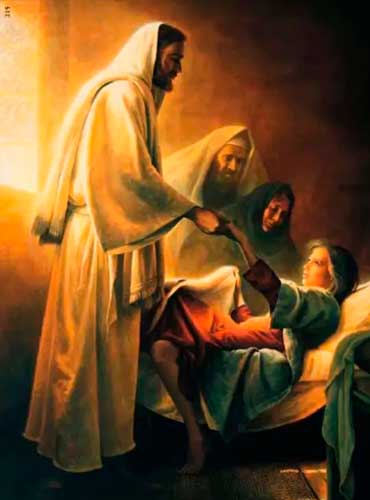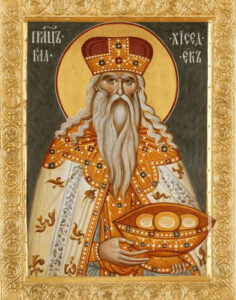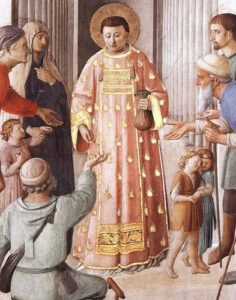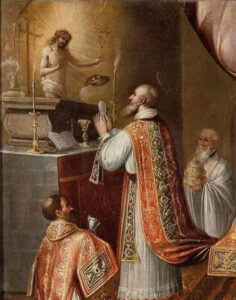Tuesday of the Fourth Week of Ordinary Time – Mk 5:21-43
Today’s Gospel presents us a very interesting series of events: we have a miracle on the way to a miracle, a sort of story within a story, all of which casts light on the nature of suffering and the importance of faith. There are three aspects that stand out: first, Jairus’ request and his faith, second, the woman and her importance, and, third, how Jesus performs the miracle.
First, Jairus’s request clearly reveals his faith in Christ, and this in two ways: first, the fact that Jairus asks Christ at all shows he really believes in Jesus’ power. As the leader in the synagogue, people were watching him closely, and certainly he will lose friends and support by turning to Christ for help. However, what is on Jairus’ mind is saving his daughter: he was willing to sacrifice his friends, his reputation, really everything, for the one thing that really mattered to him.
However, there’s also a second way in which we see Jairus’ faith: he tells Christ how to heal his daughter, namely, by laying His hands on her. Saint Peter Chrysologus offers a beautiful thought as he writes: “Those who are sick do not lay down the conditions of how they are to be cured. They only want to be made well. But this man was a ruler of the synagogue, and versed in the law. He had surely read that while God created all other things by his word, man had been created by the hand of God. He trusted therefore in God that his daughter would be re-created, and restored to life by that same hand which, he knew, had created her. . . . He who laid hands on her to form her from nothing, once more lays hands upon her to reform her from what had perished.”[1]
That walk to Jairus’ house, however, is interrupted by the woman, our second point. It seems that the woman is about as different from Jairus as possible; on the surface, they have nothing in common. Jairus was probably rich, and the woman was certainly broke. The daughter had been alive for 12 years, and the woman had been unclean, dead, as it were, to worship and spiritual life, for 12. Jairus was someone important; the woman who was healed is so unimportant that no one pays attention to her, and doesn’t even have a name. Yet, this woman who is so dead, whose faith is so small and simple that she only wants to touch Christ’s tassel, becomes the special object of Christ’s love and affection. All she wanted was physical healing, but she leaves with much more. Indeed, at the end of their conversation, Christ calls her “daughter,” a special mark of affection. The story started with a sick woman interrupting an important mission, but ends with her healed and coming to see herself as a beloved daughter, loved no less than Jairus’.
Lastly, we have the miracle itself, and, in particular, two elements: the time it took place, and the way Jesus performs it. The interruption and subsequent delay seems to have cost the girl her life. In this, the miracle resembles the raising of Lazarus, where Christ remained where He was in order to give Lazarus time to die, so to speak. It would seem that Jesus is late, too late to save the daughter. However, it’s worth recalling that the number 12 is important for the Jews: it indicates completeness, or fullness: there are 12 tribes of Israel, 12 Apostles, and more. Jesus is never early, and He’s never late: He is always exactly on time. The woman waited 12 years to be healed, and the girl had to wait 12 years to die and be resurrected. God’s timing is always perfect.
Secondly, Jesus performs the miracle very calmly: there’s no rush, like when Elisha performed a similar miracle (see 2 Kgs 4), and Jesus gently takes the girl’s hand, and speaks to her in Aramaic. It’s interesting that Mark records that fact: there must have been something about those words that stuck in his mind, perhaps a particular calm and power. In all things, Christ shows Himself to be the one in charge, the one who rules the universe, and who knows how perfectly everything is arranged in God’s providence.
Our lives are full of constant tests of our faith: we are always beset by difficulties, trials, and temptations. Some of us suffer a great deal; while God isn’t some universal aspirin who heals all of our headaches instantly, He is much more: He is a loving Father who wants us to be with Him forever in heaven. Our suffering on earth might last 12 days, or 12 months, 12 years, or until we die, but we can be certain that God’s timing is best, and that suffering is what will draw us closer to God, if we use it for that end. Suffering confers no privileges on us; it depends on what we use it for.[2] If it draws us closer to Christ, as it did for Jairus and the woman, it will have served its purpose.
Let us pray, through the intercession of Mary, Queen of Heaven, for the grace to turn to Christ in all of our needs and sufferings, and to trust in His sense of timing.
[1] Sermon 33.3.
[2] Cf. Elie Wiesel.







